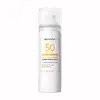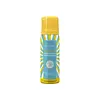What's inside
What's inside
 Key Ingredients
Key Ingredients

 Benefits
Benefits

 Concerns
Concerns

 Ingredients Side-by-side
Ingredients Side-by-side

Butane
Propane
Isobutane
Isododecane
EmollientWater
Skin ConditioningDisiloxane
Skin ConditioningDimethicone
EmollientEthylhexyl Methoxycinnamate
UV AbsorberEthylhexyl Salicylate
UV AbsorberDiethylamino Hydroxybenzoyl Hexyl Benzoate
UV FilterMenthyl Lactate
MaskingEthylhexyl Triazone
UV AbsorberSilica
AbrasiveMethyl Methacrylate Crosspolymer
Silica Dimethyl Silylate
EmollientMethicone
EmollientHamamelis Virginiana Water
AstringentMethylparaben
PreservativeAroma
Ethylhexylglycerin
Skin ConditioningPropanediol
SolventPiper Methysticum Leaf/Root/Stem Extract
Skin ConditioningCentella Asiatica Extract
CleansingScutellaria Baicalensis Root Extract
AstringentPortulaca Oleracea Extract
Skin ConditioningPhenoxyethanol
PreservativeCeramide EOP
Skin ConditioningCeramide Ns
Skin ConditioningCeramide NP
Skin ConditioningCeramide As
Skin ConditioningCeramide AP
Skin ConditioningBifida Ferment Lysate
Skin ConditioningPentylene Glycol
Skin ConditioningDiethoxydiglycol
Solvent1,2-Hexanediol
Skin ConditioningPvp
Emulsion StabilisingChlorphenesin
AntimicrobialDisodium EDTA
BHT
AntioxidantButane, Propane, Isobutane, Isododecane, Water, Disiloxane, Dimethicone, Ethylhexyl Methoxycinnamate, Ethylhexyl Salicylate, Diethylamino Hydroxybenzoyl Hexyl Benzoate, Menthyl Lactate, Ethylhexyl Triazone, Silica, Methyl Methacrylate Crosspolymer, Silica Dimethyl Silylate, Methicone, Hamamelis Virginiana Water, Methylparaben, Aroma, Ethylhexylglycerin, Propanediol, Piper Methysticum Leaf/Root/Stem Extract, Centella Asiatica Extract, Scutellaria Baicalensis Root Extract, Portulaca Oleracea Extract, Phenoxyethanol, Ceramide EOP, Ceramide Ns, Ceramide NP, Ceramide As, Ceramide AP, Bifida Ferment Lysate, Pentylene Glycol, Diethoxydiglycol, 1,2-Hexanediol, Pvp, Chlorphenesin, Disodium EDTA, BHT
Water
Skin ConditioningEthylhexyl Methoxycinnamate
UV AbsorberAlcohol
AntimicrobialC12-15 Alkyl Benzoate
AntimicrobialCollagen Water
HumectantOctocrylene
UV AbsorberC13-16 Isoparaffin
SolventDimethicone
EmollientGlycerin
HumectantButyl Methoxydibenzoylmethane
UV AbsorberLauryl PEG-9 Polydimethylsiloxyethyl Dimethicone
Skin ConditioningDisodium EDTA
Triethanolamine
BufferingPhenylbenzimidazole Sulfonic Acid
UV AbsorberMethylene Bis-Benzotriazolyl Tetramethylbutylphenol
UV FilterEthylhexyl Salicylate
UV AbsorberBis-Ethylhexyloxyphenol Methoxyphenyl Triazine
Skin ConditioningPhenoxyethanol
PreservativeCentella Asiatica Leaf Extract
Skin ConditioningGlycyrrhiza Glabra Root Extract
BleachingCalendula Officinalis Extract
Skin ConditioningBisabolol
MaskingCeramide Ng
Skin ConditioningCeramide As
Skin ConditioningCeramide Ns
Skin ConditioningAloe Barbadensis Leaf Juice
Skin ConditioningParfum
MaskingCeramide AP
Skin ConditioningCeramide Eos
Skin ConditioningCeramide EOP
Skin ConditioningCeramide NP
Skin ConditioningWater, Ethylhexyl Methoxycinnamate, Alcohol, C12-15 Alkyl Benzoate, Collagen Water, Octocrylene, C13-16 Isoparaffin, Dimethicone, Glycerin, Butyl Methoxydibenzoylmethane, Lauryl PEG-9 Polydimethylsiloxyethyl Dimethicone, Disodium EDTA, Triethanolamine, Phenylbenzimidazole Sulfonic Acid, Methylene Bis-Benzotriazolyl Tetramethylbutylphenol, Ethylhexyl Salicylate, Bis-Ethylhexyloxyphenol Methoxyphenyl Triazine, Phenoxyethanol, Centella Asiatica Leaf Extract, Glycyrrhiza Glabra Root Extract, Calendula Officinalis Extract, Bisabolol, Ceramide Ng, Ceramide As, Ceramide Ns, Aloe Barbadensis Leaf Juice, Parfum, Ceramide AP, Ceramide Eos, Ceramide EOP, Ceramide NP
 Reviews
Reviews

Ingredients Explained
These ingredients are found in both products.
Ingredients higher up in an ingredient list are typically present in a larger amount.
Ceramide AP is formally known as Ceramide 6.
Ceramides are intercellular lipids naturally found in our skin that bonds dead skin cells together to create a barrier. Having a strong skin barrier leads to more firm and hydrated skin.
They are known for their ability to hold water and thus are a great ingredient for dry skin. By bolstering the skin ceramides act as a barrier against irritating ingredients. This can help with inflammation as well.
If you would like to eat ceramides, sweet potatoes contain a small amount.
Read more about other common types of ceramides here:
Ceramide NP
Ceramide EOP
Ceramide AS is formally known as Ceramides 4 and 5.
Ceramides are intercellular lipids naturally found in our skin that bonds dead skin cells together to create a barrier. They are known for their ability to hold water and thus are a great ingredient for dry skin.
Ceramide EOP is formally known as Ceramide 1 and Ceramide 1 A.
EOP stands for a linked Ester fatty acid, a linked Omega hydroxy fatty acid, and the Phytosphingosine base.
Ceramides are intercellular lipids naturally found in our skin. They bind dead skin cells together to create a barrier. The ceramides in our skin have the ability to hold water to keep our skin hydrated.
Ceramides are an important building block for our skin barrier. A strong skin barrier helps with:
If you would like to eat ceramides, sweet potatoes contain a small amount.
Read more about other common types of ceramides here:
Learn more about Ceramide EOPCeramide NP is a type of ceramide and formally known as ceramide 3.
Ceramides are intercellular lipids naturally found in our skin that bonds dead skin cells together to create a barrier. They are known for their ability to hold water and thus are a great ingredient for dry skin.
Ceramides are an important building block for our skin barrier. A stronger barrier helps the skin look more firm and hydrated. By bolstering the skin ceramides act as a barrier against irritating ingredients. This can help with inflammation as well.
If you would like to eat ceramides, sweet potatoes contain a small amount.
Read more about other common types of ceramides here:
Ceramide AP
Ceramide EOP
Ceramide NS is formally known as Ceramide 2. It is one of the major ceramides in the stratum corneum (outermost layer of skin) plays a role in forming a protective barrier.
Due to its structure, skin lipids can be packed tightly and in turn, this strengthens the barrier and reduces water loss.
Studies show conditions like atopic dermatitis can worsen when ceramide NS levels are low.
Learn more about Ceramide NsDimethicone is a type of synthetic silicone created from natural materials such as quartz.
What it does:
Dimethicone comes in different viscosities:
Depending on the viscosity, dimethicone has different properties.
Ingredients lists don't always show which type is used, so we recommend reaching out to the brand if you have questions about the viscosity.
This ingredient is unlikely to cause irritation because it does not get absorbed into skin. However, people with silicone allergies should be careful about using this ingredient.
Note: Dimethicone may contribute to pilling. This is because it is not oil or water soluble, so pilling may occur when layered with products. When mixed with heavy oils in a formula, the outcome is also quite greasy.
Learn more about DimethiconeDisodium EDTA plays a role in making products more stable by aiding other preservatives.
It is a chelating agent, meaning it neutralizes metal ions that may be found in a product.
Disodium EDTA is a salt of edetic acid and is found to be safe in cosmetic ingredients.
Learn more about Disodium EDTAEthylhexyl Methoxycinnamate is an organic compound that provides UVB protection. It often goes by the more common name of octinoxate. It is created from methoxycinnamic acid and 2-ethylhexanol.
Ethylhexyl Methoxycinnamate absorbs UVB rays with wavelengths between 280-320 nm. UV absorbers protect your skin by using chemical reactions to convert UV rays into heat and energy.
UVB (290-320 nm) rays emit more energy than UVA rays. They are capable of damaging DNA, causing sunburns and are thought to be linked to skin cancer.
The state of Hawaii has banned sunscreens containing octinoxate due to its potential impact on coral reefs. More research is needed to bridge gaps in this research. The European Union allows higher levels of octinoxate in sunscreens than the US and Australia.
Ethylhexyl Methoxycinnamate is oil soluble. It is not stable and may lose efficacy when exposed to sunlight.
Learn more about Ethylhexyl MethoxycinnamateEthylhexyl Salicylate is an organic compound used to block UV rays. It primarily absorbs UVB rays but offers a small amount of UVA protection as well.
Commonly found in sunscreens, Ethylhexyl Salicylate is created from salicylic acid and 2-ethylhexanol. You might know salicylic acid as the effective acne fighter ingredient and BHA.
The ethylhexanol in this ingredient is a fatty alcohol and helps hydrate your skin, similar to oils. It is an emollient, which means it traps moisture into the skin.
According to manufacturers, Ethylhexyl Salicylate absorbs UV wavelength of 295-315 nm, with a peak absorption at 307-310 nm. UVA rays are linked to long term skin damage, such as hyperpigmentation. UVB rays emit more energy and are capable of damaging our DNA. UVB rays cause sunburn.
Learn more about Ethylhexyl SalicylatePhenoxyethanol is a preservative that has germicide, antimicrobial, and aromatic properties. Studies show that phenoxyethanol can prevent microbial growth. By itself, it has a scent that is similar to that of a rose.
It's often used in formulations along with Caprylyl Glycol to preserve the shelf life of products.
Water. It's the most common cosmetic ingredient of all. You'll usually see it at the top of ingredient lists, meaning that it makes up the largest part of the product.
So why is it so popular? Water most often acts as a solvent - this means that it helps dissolve other ingredients into the formulation.
You'll also recognize water as that liquid we all need to stay alive. If you see this, drink a glass of water. Stay hydrated!
Learn more about Water